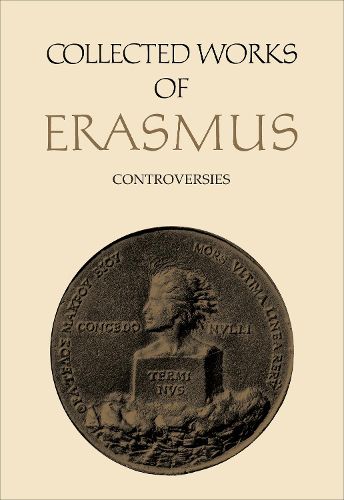Readings Newsletter
Become a Readings Member to make your shopping experience even easier.
Sign in or sign up for free!
You’re not far away from qualifying for FREE standard shipping within Australia
You’ve qualified for FREE standard shipping within Australia
The cart is loading…






This volume contains the first translation of Erasmus’ response to two of his fiercest Spanish critics.
Erasmus’ thorough engagement with the New Testament, in particular his revision of the Vulgate translation, aroused much controversy, especially in the orthodox Roman Catholic country of Spain. Erasmus had to fight fierce polemics with several people, including two Spanish scholars, Diego Lopez Zuniga and Sancho Carranza de Miranda, who were both connected to the University of Alcala. This quarrel lasted from 1520 to 1524, with a late response by Erasmus in 1529. The discussion started as a philological one, regarding correct Latin, but turned into a dogmatic-theological fight over the issues of whether the New Testament speaks of Christ as God, whether one can apply the term servus (servant) to Christ, and whether the sacramental character of matrimony can be deduced from Ephesians 5:32.
The five texts in this volume are, for the first time, translated and annotated. With elucidating notes and an introduction, the volume offers wonderful insight into a fierce and fundamental polemic over the New Testament.
$9.00 standard shipping within Australia
FREE standard shipping within Australia for orders over $100.00
Express & International shipping calculated at checkout
This volume contains the first translation of Erasmus’ response to two of his fiercest Spanish critics.
Erasmus’ thorough engagement with the New Testament, in particular his revision of the Vulgate translation, aroused much controversy, especially in the orthodox Roman Catholic country of Spain. Erasmus had to fight fierce polemics with several people, including two Spanish scholars, Diego Lopez Zuniga and Sancho Carranza de Miranda, who were both connected to the University of Alcala. This quarrel lasted from 1520 to 1524, with a late response by Erasmus in 1529. The discussion started as a philological one, regarding correct Latin, but turned into a dogmatic-theological fight over the issues of whether the New Testament speaks of Christ as God, whether one can apply the term servus (servant) to Christ, and whether the sacramental character of matrimony can be deduced from Ephesians 5:32.
The five texts in this volume are, for the first time, translated and annotated. With elucidating notes and an introduction, the volume offers wonderful insight into a fierce and fundamental polemic over the New Testament.